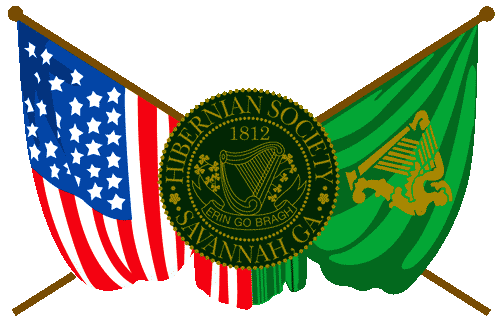

| Franklin D. Roosevelt 32nd President of the United States of America Radio Greeting from Warm Springs, Georgia March 17, 1937 |
 My friends of Massachusetts and of Georgia: It gives me great pleasure from this quiet spot in the Georgia hills to greet my friends of the Charitable Irish Society of Boston and the Hibernian Society of Savannah. Although we think of ourselves sometimes as a very young civilization, I know of no better illustration of our historic background than the story of the origin of the great Irish Societies formed for charitable purposes generations ago along the whole line of our Atlantic Seaboard. You in Boston, celebrating your two hundredth anniversary, are the oldest of the family. You in Savannah, celebrating your one hundred and twenty-fifth anniversary are the youngest. Observing this seventeenth of March are your brothers of the other old societies—the Friendly Sons of St. Patrick in the City of New York, the Friendly Sons of St. Patrick in Philadelphia, the Hibernian Society in Baltimore and the Hibernian Society of Charleston. In all these generations your Societies have lived up to the noble legend "non sibi sed aliis"— not for yourselves but for others. You have aided your own members, and many others who might be deserving of your charity. You have aided not Irishmen alone or the descendants of Irishmen—you have contributed greatly to the good of your communities as a whole. I have a particular tenderness for St. Patrick's Day for, as some of you know, it was on the seventeenth of March, 1905, that a Roosevelt wedding took place in New York City with the accompaniment of bands playing their way up Fifth Avenue to the tune of "The Wearin' of the Green." On that occasion New York had two great attractions—the St. Patrick's Day Parade, and President Theodore Roosevelt, who had come from Washington to give the bride away. I might add that it was wholly natural and logical that in the spotlight of these two simultaneous attractions the bride and the bridegroom were almost entirely overlooked and left in the background. Today, therefore, I am obtaining revenge for my obscurity on that occasion, for I am taking an actual personal part, even though it be by telephone, in one celebration of the day in the North and another celebration of the day in the South. Yes, I am always thrilled by St. Patrick's Day, the day that Irishmen the world over garner to their hearts and souls their tenderest memories, recall the ancient glories of Erin and renew their allegiance to the great Apostle of fifteen hundred years ago. Through all the vicissitudes of these fifteen centuries, through tramplings and burnings, through war and slaughter, in times of plenty and in times of famine—Ireland, and the descendants of Ireland, have been faithful to the heritage of St. Patrick. The same devotion and steadfastness to the cause of liberty within the homeland itself, has accompanied the sons and daughters of Ireland wherever they have gone, even to the far corners of the earth. Our own country owes a great debt to them for their contribution to its upbuilding. They have borne arms in our wars both in the colonial and the national periods. In commerce, agriculture, and industry, in the arts and sciences, in literature, in the professions and in the councils of state they have shown special aptitude and outstanding talent. There is a further happy coincidence in this greeting which I am sending tonight to Boston and to Savannah. My children are the direct descendants of pioneer settlers of both your cities, Savannah through their mother, and Boston through their father. I am proud to participate in these celebrations and to have this fellowship with organizations which in former years were addressed by predecessors of mine in the Presidency of the United States. "Not for ourselves but for others." That motto can well be the inspiration of all of us—not alone for the fine purposes of charity, but also for our guidance in our public and private service. Selfishness is without doubt the greatest danger that confronts our beloved country today. Good old St. Patrick—and may he ever be with us as the epitome of unselfishness. May we follow in his footsteps through all of the years. |